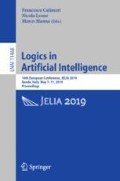Abstract
The weak completion semantics (WCS) based on three-valued Łukasiewicz logic has been demonstrated to be an adequate model for general human reasoning in a variety of different domains. Among the many experimental paradigms in cognitive psychology, the Wason Selection Task (WST) is a core problem with more than 200 publications demonstrating key factors of the systematic deviation of human reasoning from classical logic. Previous attempts were able to model general response patterns, but not the individual responses of participants. This paper provides a novel generalization of the weak completion semantics by using two additional principles, abduction and contraposition: This extension can model the four canonical cases of the WST for the Abstract, Everyday, and Deontic problem domain. Finally, a quantitative comparison between the WCS predictions of the extended model and the individual participants’ responses in the three problem domains is performed. It demonstrates the power of the WCS to adequately model human reasoning on an individual human reasoner level.
Supported by the DFG within grants RA 1934/3-1 and RA 1934/4-1.
Authors appear alphabetically.
Access this chapter
Tax calculation will be finalised at checkout
Purchases are for personal use only
Notes
- 1.
Note for a better readability, the cards are referred to by their face value. Specifically: \(D \leftrightarrow p\), \(\bar{p} \leftrightarrow K\), \(q \leftrightarrow 3\), \(\bar{q} \leftrightarrow 7\).
- 2.
Human reasoners can assume a biconditional interpretation of a conditional [6].
- 3.
For the purposes of this experiment, only results relating to the four canonical cases (\(\{D\}\), \(\{D,3\}\), \(\{D,3,7\}\), \(\{D,7\}\)) are presented. Other possible combinations were found to be quite rare and are not considered relevant to the task.
References
Costa, A., Dietz, E.A., Hölldobler, S., Ragni, M.: Syllogistic reasoning under the weak completion semantics. In: Bridging@ IJCAI, pp. 5–19 (2016)
Dietz, E.-A., Hölldobler, S.: A new computational logic approach to reason with conditionals. In: Calimeri, F., Ianni, G., Truszczynski, M. (eds.) LPNMR 2015. LNCS, vol. 9345, pp. 265–278. Springer, Cham (2015). https://doi.org/10.1007/978-3-319-23264-5_23
Dietz, E.A., Hölldobler, S., Ragni, M.: A computational logic approach to the abstract and the social case of the selection task. In: Proceedings of the 11th International Symposium on Logical Formalizations of Commonsense Reasoning, COMMONSENSE (2013)
Hölldobler, S., Kencana Ramli, C.D.P.: Logics and networks for human reasoning. In: Alippi, C., Polycarpou, M., Panayiotou, C., Ellinas, G. (eds.) ICANN 2009. LNCS, vol. 5769, pp. 85–94. Springer, Heidelberg (2009). https://doi.org/10.1007/978-3-642-04277-5_9
Powell, M.J.: A direct search optimization method that models the objective and constraint functions by linear interpolation. In: Gomez, S., Hennart, J.P. (eds.) Advances in Optimization and Numerical Analysis. MAIA, vol. 275, pp. 51–67. Springer, Dordrecht (1994). https://doi.org/10.1007/978-94-015-8330-5_4
Ragni, M., Kola, I., Johnson-Laird, P.N.: On selecting evidence to test hypotheses: a theory of selection tasks. Psychol. Bull. 144(8), 779–796 (2018)
Stenning, K., Van Lambalgen, M.: Human Reasoning and Cognitive Science. MIT Press, Cambridge (2008)
Author information
Authors and Affiliations
Corresponding author
Editor information
Editors and Affiliations
Rights and permissions
Copyright information
© 2019 Springer Nature Switzerland AG
About this paper
Cite this paper
Breu, C., Ind, A., Mertesdorf, J., Ragni, M. (2019). The Weak Completion Semantics Can Model Inferences of Individual Human Reasoners. In: Calimeri, F., Leone, N., Manna, M. (eds) Logics in Artificial Intelligence. JELIA 2019. Lecture Notes in Computer Science(), vol 11468. Springer, Cham. https://doi.org/10.1007/978-3-030-19570-0_33
Download citation
DOI: https://doi.org/10.1007/978-3-030-19570-0_33
Published:
Publisher Name: Springer, Cham
Print ISBN: 978-3-030-19569-4
Online ISBN: 978-3-030-19570-0
eBook Packages: Computer ScienceComputer Science (R0)

